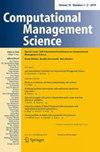An ALNS-based matheuristic algorithm for a multi-product many-to-many maritime inventory routing problem
IF 1.3
Q3 SOCIAL SCIENCES, MATHEMATICAL METHODS
引用次数: 0
Abstract
Abstract In this paper, we propose an adaptive large neighborhood search-based matheuristic algorithm to solve a multi-product many-to-many maritime inventory routing problem. The problem addresses a short sea inventory routing problem that aims to find the best route and distribution plan for multiple products with a heterogeneous fleet of vessels through a network including several producers and customers. Each port can be visited a given number of times during the planning horizon, and the stock level for each product should lie within the predefined bound limits. The problem was introduced by Hemmati et al. (Eur J Oper Res 252:775–788, 2016). They developed a mixed integer programming formulation and proposed a matheuristic algorithm to solve the problem. Although their proposed algorithm worked well in terms of running time, it suffers from disregarding a part of the solution space. In this study, we propose a new matheuristic algorithm to find better solutions by exploring the entire solution space for the same problem. In our solution methodology, we split the variables into routing and non-routing variables. Then in an iterative process, we determine the values of the routing variables with an adaptive large neighborhood search algorithm, and we pass them as input to a penalized model which is a relaxed and modified version of the mathematical model introduced in Hemmati et al. (2016). The information from solving the penalized model, including the values of the non-routing variables, is then passed to the adaptive large neighborhood search algorithm for the next iteration. Several problem-dependent operators are defined. The operators use the information they get from the penalized model and focus on decreasing the penalty values. Computational results show up to 26% improvement in the quality of the solutions for the group of instances with a large feasible solution space. We get the optimal value for the remaining instances matched with the reported results.多产品多对多海运库存调度问题的基于alns的数学算法
摘要针对多产品多对多海运库存路由问题,提出了一种基于自适应大邻域搜索的数学算法。该问题解决了一个海上库存路线问题,旨在通过包括多个生产商和客户在内的网络,为异构船队的多种产品找到最佳路线和分销计划。在规划范围内,每个港口可以访问给定次数,并且每个产品的库存水平应在预定义的边界限制内。Hemmati等人提出了这个问题(Eur J Oper Res 252:775-788, 2016)。他们开发了一个混合整数规划公式,并提出了一个数学算法来解决这个问题。尽管他们提出的算法在运行时间方面表现良好,但它忽略了解决方案空间的一部分。在本研究中,我们提出了一种新的数学算法,通过探索同一问题的整个解空间来寻找更好的解。在我们的解决方案方法中,我们将变量分为路由变量和非路由变量。然后,在迭代过程中,我们使用自适应大邻域搜索算法确定路由变量的值,并将它们作为输入传递给惩罚模型,该模型是Hemmati等人(2016)引入的数学模型的放松和修改版本。求解惩罚模型得到的信息,包括非路由变量的值,然后传递给自适应大邻域搜索算法进行下一次迭代。定义了几个与问题相关的操作符。操作者利用他们从惩罚模型中得到的信息,专注于减少惩罚值。计算结果表明,对于具有较大可行解空间的实例组,解的质量提高了26%。我们得到与报告结果匹配的剩余实例的最优值。
本文章由计算机程序翻译,如有差异,请以英文原文为准。
求助全文
约1分钟内获得全文
求助全文
来源期刊

Computational Management Science
SOCIAL SCIENCES, MATHEMATICAL METHODS-
CiteScore
1.90
自引率
11.10%
发文量
13
期刊介绍:
Computational Management Science (CMS) is an international journal focusing on all computational aspects of management science. These include theoretical and empirical analysis of computational models; computational statistics; analysis and applications of constrained, unconstrained, robust, stochastic and combinatorial optimisation algorithms; dynamic models, such as dynamic programming and decision trees; new search tools and algorithms for global optimisation, modelling, learning and forecasting; models and tools of knowledge acquisition.
The emphasis on computational paradigms is an intended feature of CMS, distinguishing it from more classical operations research journals.
Officially cited as: Comput Manag Sci
 求助内容:
求助内容: 应助结果提醒方式:
应助结果提醒方式:


